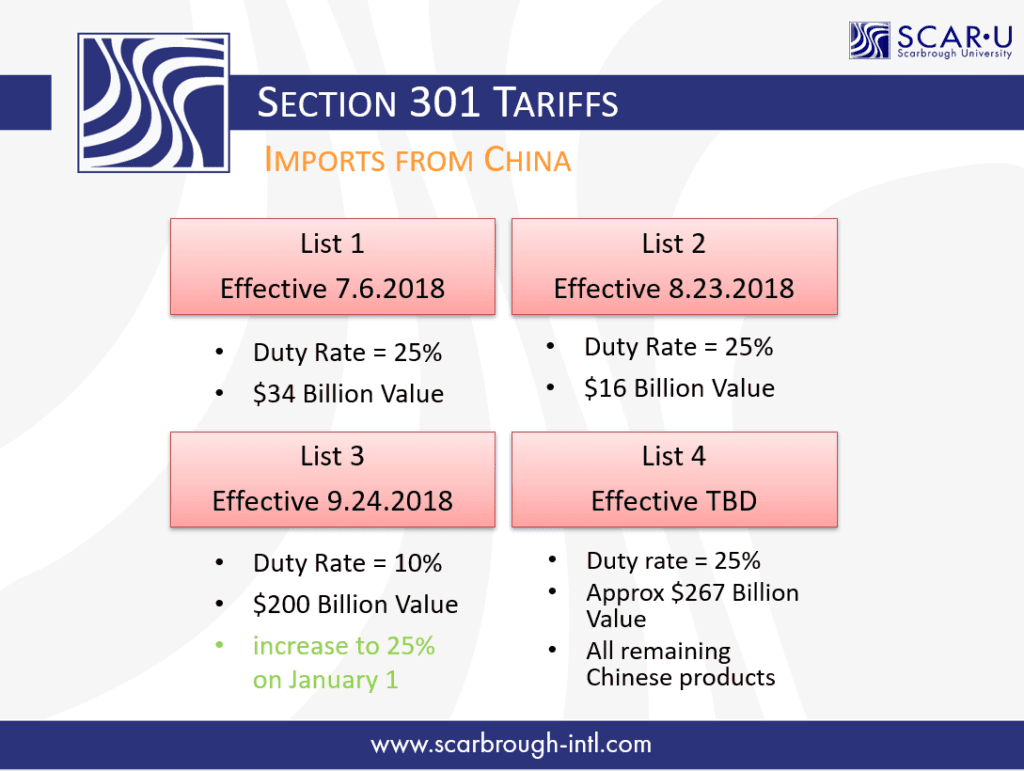U.S. – China Trade Truce
U.S. – China Trade Deal in Discussions
United States’ President Trump and China’s President Xi Jinping met on the sidelines of the G20 Summit in Buenos Aires this past weekend to discuss their differences in trade. The outcome? A truce to the trade war and a pause on threatened tariff increases on January 1, 2019. For now, anyway.
My meeting in Argentina with President Xi of China was an extraordinary one. Relations with China have taken a BIG leap forward! Very good things will happen. We are dealing from great strength, but China likewise has much to gain if and when a deal is completed. Level the field!
— Donald J. Trump (@realDonaldTrump) December 3, 2018
An article in the New York Times states, “It’s an incredible deal. It goes down, certainly — if it happens, it goes down as one of the largest deals ever made,” Mr. Trump told reporters late Saturday night aboard Air Force One. China’s foreign ministry in a statement characterized the meeting as ‘very successful,’ adding, “The two sides proposed a series of constructive plans on how to properly resolve existing differences and problems.”
President Trump is going to take some time on this one to ensure there’s a real deal. If there isn’t a good deal on the table, he will proceed with the future tariffs in January, but for now, they have been postponed for 90 days. The tariffs in this scenario are those included in List 3 highlighted below: $200 billion worth of goods with a current 10% additional duty rate imposed on September 24, 2018, which will stay in effect.
Current Section 301 Tariffs
Let’s debrief the Section 301 situation. List 1, effective July 6, 2018 places an additional duty rate of 25% on $34 billion worth of goods from China. List 2, effective August 23, 2018 places an additional duty rate of 25% on $16 billion worth of goods from China. List 3, effective September 24, 2018 places an additional 10% on $200 billion worth of goods from China, but is slated to jump to 25% on January 1, 2019. It has been announced that a possible List 4 will take effect date-to-be-determined with an additional duty rate of 25% on $267 billion worth of goods from China. List 4 would encompass all other goods originating from China.

United States Representatives, Mr. Lighthizer and Mr. Mnuchin will be brokering the trade talks with China. In fact, Mr Mnuchin suggests “that all tariffs could be phased out eventually as China meets its commitments to make changes over a period of time.” However, the new agreement hints that List 1 and List 2 tariffs may remain permanent, “if not in place for a protracted period. Those initial tariffs were intended to largely spare American consumers while targeting imports that the administration sees as a threat to national security — like nuclear reactor parts, spacecraft and aeronautical gear. The tariffs were also imposed on a variety of other products, like agricultural equipment, that Beijing has made a priority with its Made in China 2025 industrial policies program.” [New York Times]
Farmers will be a a very BIG and FAST beneficiary of our deal with China. They intend to start purchasing agricultural product immediately. We make the finest and cleanest product in the World, and that is what China wants. Farmers, I LOVE YOU!
— Donald J. Trump (@realDonaldTrump) December 3, 2018
Deadline
The representatives have been given a 90-day deadline for trade talks. They hope to have something concrete by March 1, 2019. The Chinese has already agreed to resume buying agriculture and energy products from The United States, but has a long way to go.
“President Trump and President Xi have agreed to immediately begin negotiations on structural changes with respect to forced technology transfer, intellectual property protection, non-tariff barriers, cyber intrusions and cyber theft, services and agriculture. Both parties agree that they will endeavor to have this transaction completed within the next 90 days. If at the end of this period of time, the parties are unable to reach an agreement, the 10% tariffs will be raised to 25%.” [Source]
Some other comments that were mentioned include the fact that Chinese automakers have disclosed plans to enter the American market in 2020 and to reduce retaliatory tariffs on American cars exported into China, although no Chinese statement has backed up the comment about Chinese retaliatory tariffs.
China has agreed to reduce and remove tariffs on cars coming into China from the U.S. Currently the tariff is 40%.
— Donald J. Trump (@realDonaldTrump) December 3, 2018
Furthermore, the White House statement over the recent working dinner with China suggests the following: “Very importantly, President Xi, in a wonderful humanitarian gesture, has agreed to designate Fentanyl as a Controlled Substance, meaning that people selling Fentanyl to the United States will be subject to China’s maximum penalty under the law.”
President Trump stated:
“This was an amazing and productive meeting with unlimited possibilities for both the United States and China. It is my great honor to be working with President Xi.”
Sources:
